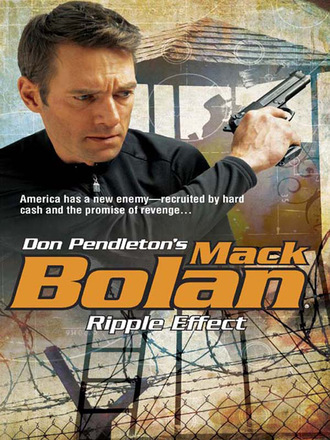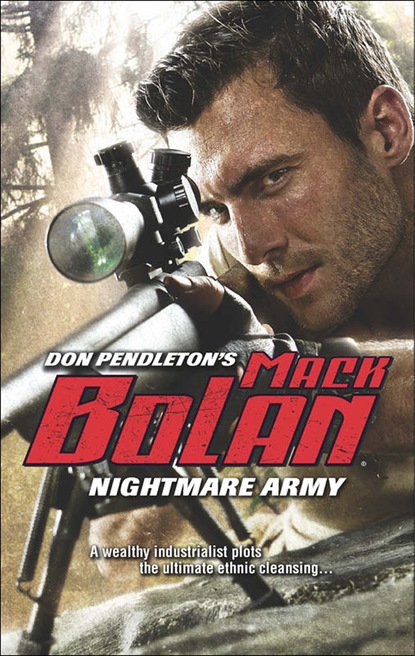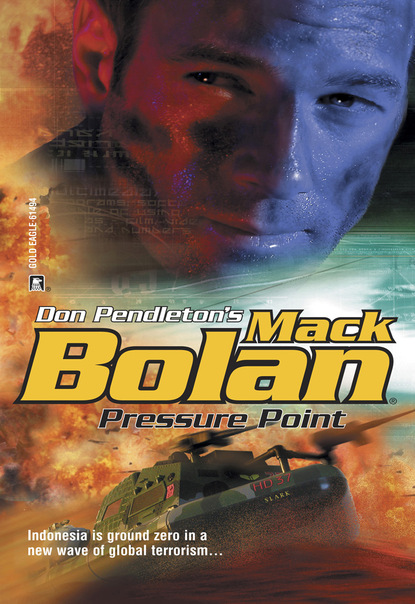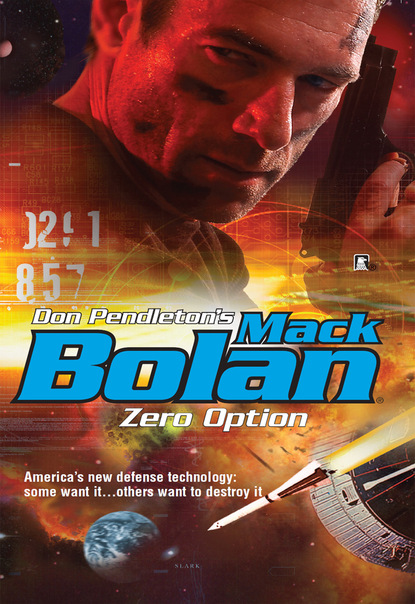
Полная версия
Ripple Effect

Ripple Effect
Don Pendleton’s Mack Bolan

For Gunnery Sergeant Carlos Nathaniel Hathcock III,
USMC
Special thanks and acknowledgment to Mike Newton for his contribution to this work.
CONTENTS
PROLOGUE
CHAPTER ONE
CHAPTER TWO
CHAPTER THREE
CHAPTER FOUR
CHAPTER FIVE
CHAPTER SIX
CHAPTER SEVEN
CHAPTER EIGHT
CHAPTER NINE
CHAPTER TEN
CHAPTER ELEVEN
CHAPTER TWELVE
CHAPTER THIRTEEN
CHAPTER FOURTEEN
CHAPTER FIFTEEN
CHAPTER SIXTEEN
CHAPTER SEVENTEEN
CHAPTER EIGHTEEN
EPILOGUE
PROLOGUE
Camp X-ray—Guantanamo Bay, Cuba
Lieutenant Jordan Lewis hated meeting with the CIA. He knew the standard rap, of course—brothers in arms, collaborating in the war on terror, all that happy stuff—but there was still something about the Company that set his nerves on edge.
For one thing, it was flat-out wrong for spooks to give the orders—any orders—on a military base run for the better part of a century by the United States Marine Corps. Worse than wrong, it pissed him off.
The job at Camp X-ray was hard enough without demanding that the military personnel on-site kiss Langley’s ass.
And what a job it was, containing several hundred “enemy combatants” snatched from various locales over the past six years, beginning in Afghanistan, proceeding to Iraq, and then some places the civilian public didn’t even know about. Most of the hostiles caged at Camp X-ray would never face a formal charge. Hell, most of them still hadn’t been identified to any court, congressional committee or defense attorneys. They were locked down tight and going nowhere unless Uncle Sam decided, in his own sweet time, that they were clean.
And that was where Lewis found himself compelled to share his space with cloak-and-dagger types who thought the information superhighway ran only one way. The spooks reminded him of leeches. They crept in, latched on to files and prisoners, sucked out whatever they could use, then crept away without a simple thank-you to the men and women who maintained their feeding station. It was damned elitist arrogance, no other way to read it, and it sometimes made Lewis wish that he could punch them out, beginning at the top and working down.
He could’ve borne their snotty attitude a little better if they got results in the real world, but after six years of interrogation, eavesdropping and fudging data, what was the result?
Nada.
Lewis heard the vague pronouncements coming out of Washington, whenever some fat cat believed his job was riding on the line. He’d blather on about the terrorist attacks that had been averted, suspects captured, lives that had been saved—and naturally, all of it was classified.
But Jordan Lewis knew the truth.
He knew that in the years of his assignment to Camp X-ray, there had been no major breaks of any kind. Osama was still out there, and funds kept flowing to al Qaeda from the usual suspects. Most of them, in turn, were cozily in bed with “patriotic” politicians in the States, none of their countries facing any sanctions, threats of military intervention or preemptive strikes.
It was a crazy world, and Jordan Lewis was accustomed to it. He knew that there would always be another war, as long as men could scheme against one another in the halls of power, and he understood his role in that reality. He understood that there were rules, and also times when they were set aside to serve the greater good.
No problem.
He could twist arms with the best of them when it was called for, but he didn’t like some smarmy frat boy from the Ivy League intruding, telling him that he had done it wrong, suggesting that he try another angle of attack or step aside and let them do it, acting all superior while they were showing him the door.
This day, the new arrival was Bob Armstrong, or so he called himself. Lewis suspected that the name was every bit as phony as his smile. Armstrong was roughly the same age as Lewis, spoke with just a trace of a New England accent and was always groomed as if he half expected paparazzi to be waiting for him at the gates.
Some days Lewis thought about trying a change of scene, maybe a tour in Sandland, but he didn’t want to press his luck.
They also serve who only sit with spooks.
To hell with it, he thought. It’s what they pay you for.
And with that thought in mind, Lewis buzzed his orderly. “Corporal,” he said, “show Mr. Armstrong in.”
A moment later, there he was, all styling gel, bleached teeth and Harvard attitude. Wearing a smile as phony as the spook’s, Lewis walked around his desk to shake the agent’s hand.
HASAM KHALED WAS WORRIED, for himself and for the great jihad. A new round of interrogations had begun, and while it had been several months since he was questioned, granting ample time for him to rest, Khaled feared that he might be weakening in custody. He had been too long out of contact with his brothers, and despite his faith in Allah to sustain him, lately there had been no answer to his prayers.
Each time the smug Americans passed by his cage, selecting someone else to grill for information, he was certain they had come for him. Someday they would, and who knew what techniques they would employ this time?
Before, they had progressed from stilted courtesy to bullying and threats, suspension of his so-called privileges. Diet could be adjusted in proportion to collaboration with the enemy, so Khaled lost weight. He didn’t mind the sacrifice of flesh, content to know that Paradise awaited him.
But if he broke, what then?
The whispered rumors frightened him. In place of simple tactics—insults, threats, sleep deprivation—it was said that more effective methods soon might be employed. Torture, perhaps, or forced “repatriation” to some allied country where interrogators weren’t as squeamish as Americans. Or drugs, the kind that robbed even a dedicated warrior of his wits and his determination to resist.
Hasam Khaled was frightened of the drugs. Torture was fearful, but he thought—hoped, prayed—that he could weather beatings, possibly electric shocks, without soiling his honor. Drugs, however, stole a victim’s will and left him helpless, babbling everything he knew to agents of the Great Satan.
And once Khaled began to talk, how could he stop?
There had to be something he could do.
Khaled recalled his training, exhortations that prepared him to give up his life for God’s holy cause. He had been lucky so far, stunned in an explosion that inflicted only minor injuries but killed his two companions and a number of civilians. The Americans weren’t entirely sure whether Khaled was a combatant or a bystander, but they had shipped him to Cuba anyway. Uncertainty had given him a way to dodge their questions, up to now, but if they came at him with drugs…
There was one obvious alternative. He could become a martyr to the cause, not unlike those who strapped explosives to their bodies and then detonated them where it would do the most harm to their enemies. His self-inflicted death, while not as grandiose as an explosion in a market filled with Zionists or U.S. soldiers, still could serve the cause and bring great honor to his name, his family.
Khaled’s imam had been explicit on that subject. Any death in God’s service was commendable. He didn’t have to kill a hundred enemies, or even one. It was enough that he intended to destroy the infidels, and by his death prevented God’s enemies from gaining an advantage in the struggle. If by dying he could snatch salvation from the fingertips of targets marked for death by his comrades, Khaled would be a hero.
And his place in Paradise would be assured.
That vision made him strong—or stronger than he might have been without it.
Escape wasn’t an option, Khaled realized, and while some other inmates of the camp had been released to satisfy the Red Cross or the media, once he was questioned under medication there would be no possibility of freedom. Once they heard his secret, Khaled might be whisked away to the American mainland for further questioning, until the heathen bastards satisfied themselves that they knew everything.
And would it be enough to save them?
Possibly.
Khaled couldn’t be sure. He knew only a name, a fragment of a rumor shared by comrades in the dead of night. He had no details of the master plan itself, but once the name was given to his enemies, the rest might be superfluous. The scouring of dossiers and databases would begin, and ultimately they would have the man himself.
Khaled couldn’t permit it.
There were no weapons in his cell, of course—or none, at any rate, regarded by his captors as a weapon. But the simple cotton robe he wore could serve him as an instrument of suicide.
And when he’d finished with it, they could use if for his shroud.
There was no privacy in Camp X-ray, but neither was Khaled exposed in fact to round-the-clock surveillance. When he pulled the plain white robe over his head, no one except the occupants of two adjoining cages saw him do it. Neither spoke as he stood tall on tiptoes, double-knotting one sleeve of the robe to bars that formed the ceiling of his cage.
Neither adjoining prisoner called out for help as Khaled tied a makeshift noose around his neck and pulled it tight. They offered no objection as he checked the simple hang-man’s rope for length, then climbed the nearest barred wall of his cage for altitude.
The bars were slippery. He almost lost his grip and tumbled back, but that wouldn’t provide enough impact to stun him and prevent his hands from rising to the noose as he began to choke. In case his will to live proved stronger than his faith, Khaled was banking on a sharper drop to render him insensible.
A few more inches now. That should be high enough. The floor seemed far below him, like the bottom of a canyon. All illusion, in his present agitated state.
With one last prayer, Hasam Khaled released his grip and plummeted toward Paradise.
BOB ARMSTRONG DIDN’T CARE much for the spit-and-polish military types. He tolerated them whenever necessary, wore a smiling mask to hide his general contempt for amateurs who meddled in intelligence, and he never under any circumstances gave away the information his superiors had classified as need-to-know.
Sometimes, like now, he’d flatter certain officers with lies or slick evasions when they had to work in tandem toward specific goals, but he would no more tell a grunt in uniform what he was really thinking than he’d drop his pants and wag the weasel at a formal diplomatic function.
Some things were simply not done by professionals. Full stop. Case closed.
But sometimes you had to prime the pump, and so he said, “The truth, Lieutenant Lewis—may I call you Joseph, by the way?”
“It’s Jordan.”
“Ah, my apologies. Then, may I—?”
“No.”
“Okay.” Big smile. “The truth, Lieutenant Lewis, is that Langley’s under fire right now with accusations that we overlook the little things. Nobody seems to care much if a war goes on for years with no result, but we catch hell if we don’t know the dictator of the day’s zip code. You follow me?”
“Not yet,” the Marine said.
“My point is that we want to dot our i’s and cross our t’s, make sure we don’t miss any little thing, regardless of how insignificant it seems.”
“And that affects me…how?” the lieutenant asked.
“I’ve been asked to start from scratch with some of the neglected prisoners. Not my word, mind you. From the top, you know? Wish I could duck it. Big pain in the neck, I realize, but there it is.”
“No problem,” the lieutenant answered somewhat stiffly. “Do you have a list, or are we starting over alphabetically?”
“I have a list,” Armstrong admitted, “but it’s more like alphabet soup. They’ve been prioritized somehow, by someone. You can ask me how, why, who, but I don’t know. God’s truth.”
He was about to put a hand over his heart, but thought that might be overdoing it.
“I don’t require an explanation, Mr. Armstrong,” Lewis said. “When did you want to start?”
“This morning, if that’s feasible.”
“I’ll need your list.”
“Of course.” Armstrong retrieved two sheets of folded paper from an inside pocket of his jacket, passing them across the desk. Lewis unfolded them, blinked once, then tried to mask his surprise as he surveyed the twin columns of small, single-spaced type.
“This looks like nearly half the men in camp,” the lieutenant said.
“Is it?” Armstrong cocked an eyebrow, as if mildly curious. “I couldn’t say.”
“And these have been prioritized, you say? Does that mean that the first, say, dozen on the list are now prime terrorism suspects?”
Armstrong shrugged, his face contorting into something that approximated puzzlement. “Beats me,” he said. “For all I know, they could have ranked them in reverse order, with small-fry at the top. I really couldn’t say.”
“Mm-hmm.” Lewis looked skeptical, to say the least. “And you want to begin with number one, meaning top left on the first page?”
“Correct.”
“And work your way down column one, then back up to the top of column two? Or zigzag down the page?”
Armstrong pretended not to know that the jarhead was making fun of him. “Straight down, I think. If that’s all right with you.”
“Whatever,” Lewis said. “These clowns aren’t going anywhere. You want to start right now?”
“Ideally, yes,” Armstrong replied.
“Suits me. I’ll see if we have an interpreter available.”
Armstrong relaxed and watched the officer go through his pantomime. In fact, as he well knew, Camp X-ray always had interpreters available. It couldn’t function otherwise, with prisoners who spoke at least three languages aside from Arabic.
After another moment on the telephone, Lewis cradled the receiver, donned a tight-lipped smile and said, “I have a man you can use to get started this morning. Later on today, we’re jammed up pretty tight.”
“Where there’s a will….”
“I’ll see what I can do. No promises.”
“Of course.” He didn’t feel like flexing any hidden muscles at the moment. If the jarhead still felt prickly around lunchtime, Armstrong would reach out and pull whatever strings it took to scorch his lazy ass.
“In that case,” Lewis said, “we’re just waiting for the interpreter. He’s coming over from the barracks as we speak.”
“That should be—”
Sudden rapping on the office door distracted him. The sergeant from the outer waiting room entered, flicked a distracted glance at Armstrong, then told Lewis, “Sir, we’ve had another…incident.”
“Explain,” Lewis commanded. When the sergeant looked again at Armstrong, the lieutenant added, “Sergeant, please speak freely.”
“Yes, sir. It’s another suicide attempt. One of the inmates tried to hang himself.”
“Which one?”
The sergeant looked down at his cupped left hand, where Armstrong saw a sticky note not quite concealed. “His name’s Hasam Khaled, sir. Just a nobody, as far as we can tell. One of the men on walk-through found him hanging in his cell and cut him down.”
“You said he tried to hang himself. How badly is he hurt?” Lewis inquired, sounding as if he didn’t really care much either way.
“Should be all right, sir. That’s the word for now, at least. The medics have him in sick bay.”
“All right. Dismissed.”
The sergeant wheeled around and left the office, closed the door behind him.
“Lieutenant,” Armstrong said, “I’d like to climb out on a limb here, and suggest a change of plans.”
“Not sure I follow you,” said the Marine.
“I’d like to reprioritize that list a bit.”
“Meaning?”
“I want to put a new name at the top.”
“Okay. Which one?”
“I’ll have my first chat with Hasam Khaled.”
“The loser who just tried to off himself?” Lewis seemed surprised.
“That’s right.”
“You mind if I ask why, exactly?”
As it happened, this time Armstrong didn’t mind at all. “He’s anxious to get out of here by any means available,” he said. “That tells me that he’s either cracked and lost his mind—or maybe, just maybe, has something to hide.”
AT FIRST, HASAM KHALED believed that he had found his way to Paradise, but then he felt the harsh pain in his neck and grimaced as his vision cleared. If this was Paradise, then the imam had lied and there was no reward worthy of sacrifice.
Before that sacrilegious thought could take root in his head, Khaled woke to the fact that he was still alive, apparently sequestered in the camp’s infirmary. He had accomplished nothing, other than inflicting needless pain upon himself.
Hoping the noose might have destroyed his vocal cords, he cleared his throat, then tried to speak. The words were hoarse and painful, but he heard them clearly, even though he whispered.
“Doctor,” someone said beyond his line of sight, “this one’s awake.”
“Good thing,” another voice replied. “I’ve got them breathing down my neck.”
Khaled was functional in English, but he still had trouble with its slang and idioms. Why, for example, would one person breathe into another’s neck, except for purposes of artificial respiration? And the second speaker clearly didn’t require such treatment, since he had ability to breathe and speak unaided.
Faces loomed beside his narrow bed, one man with a white coat over his uniform, the other garbed in the fatigues worn by all guards throughout the camp. Khaled had studied rank insignia for the Great Satan’s military forces, and he recognized the white coat as a first lieutenant, while the other was a corporal of the United States Marines.
His mortal enemies.
“Mr. Khaled?” The white coat peered into his face and raised a fist, the index finger pointed up. “How many fingers do you see?”
He had a normal hand. “Five,” Khaled said.
The white coat raised another finger, to create a V. “How many now?” he asked.
“Still five.”
“He’s yanking you, Lieutenant,” the corporal said.
“You think?”
Scowling, the officer informed Khaled, “You have some visitors. Their sense of humor sucks.”
Khaled did not attempt to turn his head. He’d let his enemies do all the work, while he focused upon resisting them.
A moment later, two new faces flanked his bed. One was a sergeant in his early twenties, while the other was a slightly older man, blond haired, wearing some kind of business suit.
The suit spoke first. “Hasam Khaled?”
Khaled didn’t respond. He was determined to say nothing, come what may. If later he was forced to scream, perhaps it wouldn’t count against him in the eyes of God.
“That was quite an accident you had,” the blonde remarked. The sergeant translated his words to Arabic.
What accident? He’d tried to hang himself. The only accident had been his failure to achieve that end.
“Escape attempts are frowned upon, you realize.”
Escape? Khaled concluded that the blond man was a fool, perhaps insane.
“It adds time to your sentence, get it? And you haven’t even had your trial yet. Honestly, Hasam, what were you thinking?”
That’s for me to know, Khaled thought, tuning out the voice of the interpreter.
“I’d like to help you, if I can,” the American said.
Then kill yourself, Khaled answered silently. It took an effort not to smile, but even thinking seemed to hurt his injured throat.
“Of course, I can’t do anything on your behalf, unless you’re willing to cooperate.”
Never.
“A few quick questions,” the blonde said. “Nothing earth-shattering, you understand. The basic sort of thing. Name, rank and what have you.”
The blonde was lying. Khaled smelled it on him.
“But if you won’t help,” the litany went on, “well…”
Here it comes. First threats, then pain. Khaled tried to prepare himself, but it was difficult, not knowing how his captors would torment him.
“I suspect,” the suit remarked off-handedly, “that you could use some medicine. Sergeant?”
“I’ll fetch the medic, sir.”
Briefly alone, the blonde bent lower, almost whispering. “If you can follow this at all, I really think that you should talk to me, without the needles. Once they start…well, hey, I never knew a doctor who could say, ‘Enough’s enough.’ Have you? Hasam? Okay. Don’t say I didn’t warn you.”
The sergeant returned with a different white coat, this one balding and grim in the face. The new arrival carried a hypodermic syringe half filled with milky fluid.
Hasam Khaled recoiled—or would have, if his arms and legs hadn’t been pinned by heavy leather straps. All he could do was wriggle, strain against the leather, as the medic with the needle swabbed his arm with alcohol, then spiked him.
Khaled was expecting pain, but in its place euphoria suffused his body. For a moment, he imagined they were killing him—some executions in America were carried out with poisoned hypodermics—but that made no sense. They couldn’t question him if he was dead.
No. They were lulling him with drugs, polluting him with chemicals to make him speak. Khaled determined to resist Satan’s technology at any cost, even if he was forced to bite his tongue and drown in his own blood.
That sounded like a good idea, but when he tried it, Khaled found his jaws unwilling to obey. In fact, the very notion seemed so silly that he nearly burst out laughing.
“Hasam? Earth to Hasam?”
The blonde was speaking once again, his translator echoing everything he said, like an annoying television sound track.
“Feeling better, Has, my man? That’s good. Now, let’s get down to business, shall we?”
Business? I was never very good at business. You can ask my father. He will—
“What I need to know, first thing,” the rude blonde interrupted him, “is why you tried to kill yourself. Just tell me that, for starters, and we’re on our way.”
“Secret,” Khaled whispered, not realizing for an instant that he’d spoken.
Stop! Resist! Say nothing, in the name of God!
“Secret? Now we’re getting somewhere, Hassy. May I call you Hassy? Good. About this secret, now. What is it?”
Although Khaled had spoken English, the interpreter continued with his task.
“Too great. I must…not…tell.”
“We’re all friends here,” the blonde assured him, smiling like a sneaky thief. “You can tell me anything. Don’t be embarrassed. Hassy, I can promise you, I’ve heard it all.”
“Not this.”
“Surprise me, then. I’m always up for something new.”
Khaled could feel the smile form on his face. “You will know soon enough,” he said.
“Will I?” the blonde replied. “All right, then, but I’d like a little preview, if you don’t mind. What we call a trailer, in the States. A glimpse, to you. How’d that be, Hassy?”
Still Khaled resisted, but he couldn’t fight the drugs forever. Finally, weeping for shame and the inevitable loss of Paradise, he spoke a name.
CHAPTER ONE
Cocoa Beach, Florida
Mack Bolan, aka the Executioner, walked along a quiet, nearly vacant beach at sunrise. It was nearly vacant, since a beach bum and his lady had apparently camped out the night before, somehow avoiding the nocturnal beach patrol to plant their sleeping bags above the high-tide water-line. They were engrossed in each other as he passed, ignoring him, waking to yet another day of—what?












